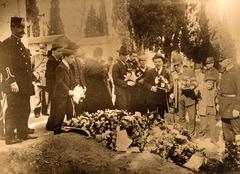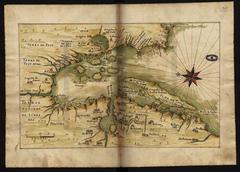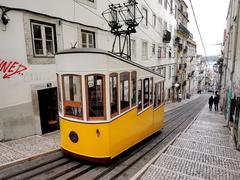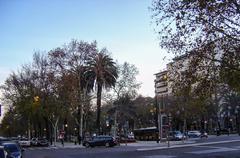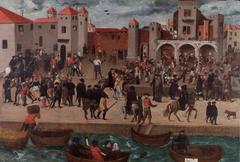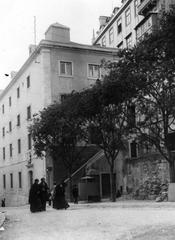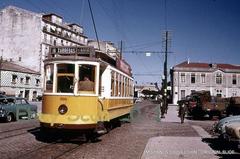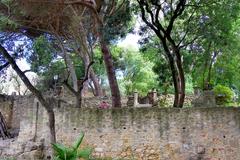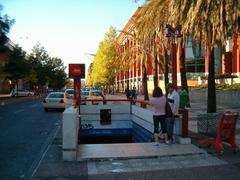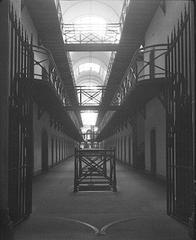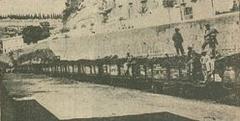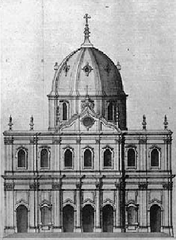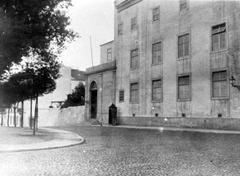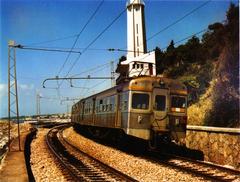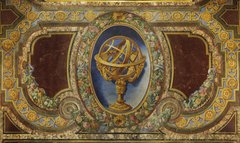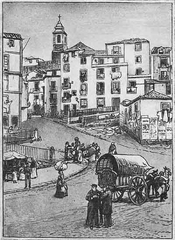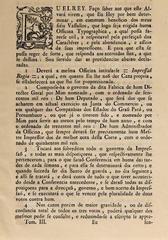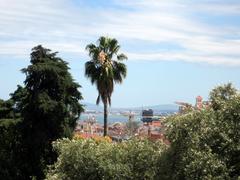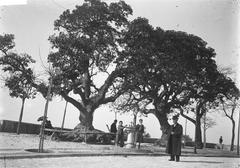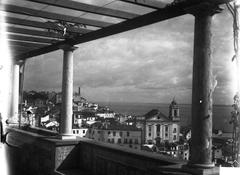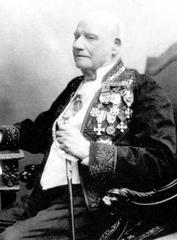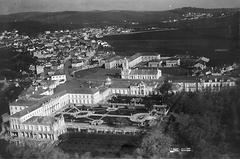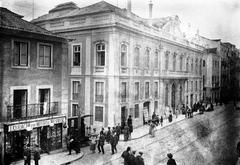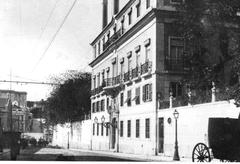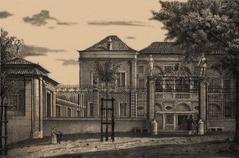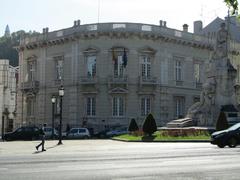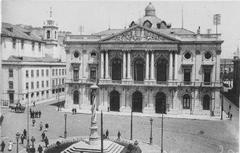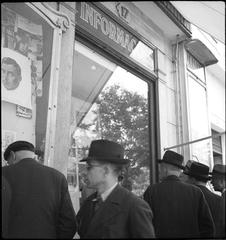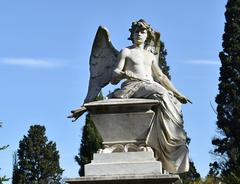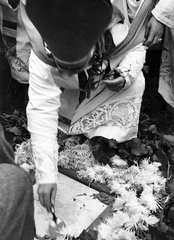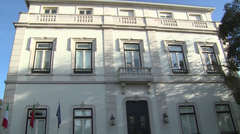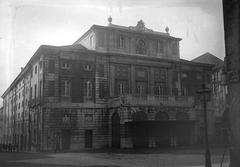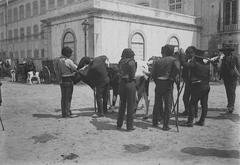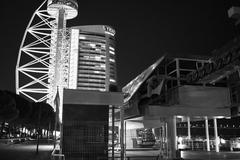Astronomical Observatory of Lisbon: Visiting Hours, Tickets, and Complete Guide
Date: 14/06/2025
Introduction
Nestled within the lush Tapada da Ajuda park in western Lisbon, the Astronomical Observatory of Lisbon (Observatório Astronómico de Lisboa, OAL) stands as a testament to Portugal’s scientific innovation and cultural legacy. Established in the mid-19th century, the observatory is both an architectural marvel and a hub of astronomical research, education, and public engagement. Visitors can expect a rich experience exploring historical instruments, participating in guided tours, and enjoying panoramic city views—all within a setting that beautifully blends past and present (Trienal de Lisboa; Portugal Expert).
This guide provides everything you need to know for a rewarding visit, including detailed visiting hours, ticketing options, accessibility information, the observatory’s historical and scientific significance, nearby attractions, and practical tips.
Table of Contents
- Introduction
- Historical and Scientific Overview
- Visiting Information
- Visitor Experience
- Nearby Attractions & Travel Tips
- Frequently Asked Questions (FAQ)
- Conclusion & Next Steps
- References
Historical and Scientific Overview
Origins and Foundation
The OAL was founded during Portugal’s 19th-century drive for scientific modernization, under the patronage of King Pedro V. Inspired by the design of Russia’s Pulkovo Observatory, French architect Jean François Gille Colson and his Portuguese collaborators adapted the plans to Lisbon’s unique topography (Museum With No Frontiers; JoHoST). Construction began in 1861 and was completed in 1867, marking a new era in Portuguese astronomy.
Architectural Design and Features
The observatory’s striking neo-classical structure features a central circular block, crowned by a decorated dome, and flanked by smaller cupolas. Its strategic hilltop location provides clear skies for celestial observation and stunning vistas over the Tejo (Tagus) River. The interiors boast elegant woodwork, period furnishings, and original scientific equipment, including chronometers, chronographs, and a historic Circle Meridian telescope (Wikipedia; Portugal Expert).
Research Contributions and Legacy
The OAL quickly gained international recognition for its advancements in meridian astronomy, star cataloguing, and timekeeping. It contributed significantly to the solar parallax campaign (1900–1901) and the Carte du Ciel project, helping define the Astronomical Unit and earning the Valz Prize from the French Academy of Sciences. Later, the observatory became part of the University of Lisbon’s National Museum of Natural History and Science (MUHNAC), expanding its educational role (Museum With No Frontiers; OAL Official Website).
Visiting Information
Hours & Ticketing
- Opening Days: Tuesday to Sunday
- Hours: 10:00 AM – 5:00 PM (Closed Mondays and national holidays)
- Tickets:
- Adults: €5
- Seniors (65+), Students, Children (6–12): €3
- Children under 6: Free
- Group and family rates: Available upon request
Tickets can be purchased online via the official website or at the entrance. Advance booking is advised, especially for guided tours or during special events.
Location & Accessibility
- Address: Calçada da Tapada, 56, Alcântara, Lisbon
- Public Transport: Bus lines 728, 742; nearby Alcântara-Terra train station
- Parking: Limited availability—public transport recommended
- Accessibility: Most areas are wheelchair accessible, with ramps and adapted restrooms. Some historic sections have limited access due to architectural constraints. Contact the observatory for special arrangements.
Guided Tours & Events
- Guided Tours: Offered on Wednesdays and Saturdays (2:00 PM – 6:00 PM), and by appointment. Tours cover the main dome, historic instruments, and the observatory’s scientific legacy. English tours available on request.
- Special Events: Monthly stargazing sessions, educational workshops, and public lectures are scheduled throughout the year. Advance registration is required for observing sessions.
Visitor Experience
Facilities & Amenities
- Restrooms available (may be limited during peak times)
- No on-site café; refreshments nearby in the Ajuda district
- Museum area with rotating exhibitions
Exhibitions & Collections
- 19th-century refracting telescope—once among Europe’s largest
- Original scientific instruments, star charts, and photographic plates
- Timekeeping devices, including the historic time ball used for ships on the Tagus River (OAL Time Service)
- Interactive and multimedia displays (rotating exhibitions)
Special Events & Stargazing
- Nighttime sessions for celestial events (meteor showers, eclipses, planetary oppositions)
- Public lectures and astronomy festivals
- Citizen science projects and educational workshops (OAL Citizen Science)
Photography & Etiquette
- Photography allowed in most areas; flash and tripods may be restricted
- Respect signage and staff instructions, especially during stargazing sessions
Nearby Attractions & Travel Tips
- Ajuda National Palace and Botanical Garden of Ajuda—within walking distance
- Belém District: Jerónimos Monastery, Belém Tower, National Coach Museum
- Tapada da Ajuda park: Ideal for walks and picnics; wear comfortable footwear for uneven terrain
- Use public transport when possible; parking is limited
Frequently Asked Questions (FAQ)
Q: What are the visiting hours?
A: Tuesday–Sunday, 10:00 AM–5:00 PM. Closed on Mondays and national holidays.
Q: How do I book a tour or observing session?
A: Book through the official website or by contacting the administration.
Q: Are guided tours available in English?
A: Yes, upon request.
Q: Is the observatory accessible for visitors with disabilities?
A: Most areas are accessible; contact staff for specific needs.
Q: Can I take photos?
A: Yes, in most areas. Restrictions may apply during special events.
Q: Are there special events or stargazing nights?
A: Yes, check the website for schedules and registration details.
Conclusion & Next Steps
The Astronomical Observatory of Lisbon offers a unique blend of historical architecture, scientific discovery, and educational engagement. Whether exploring its preserved instruments, joining a guided tour, or participating in stargazing events, visitors experience a remarkable journey through Portugal’s astronomical heritage.
Plan your visit:
- Check OAL’s official website for the latest information on tickets, tours, and events
- Book tickets and tours in advance, especially during peak seasons
- Combine your visit with nearby cultural sites for a rich Lisbon experience
- Download the Audiala app for interactive maps, audio guides, and event updates
Discover the cosmos and Portugal’s scientific legacy at the Astronomical Observatory of Lisbon—an essential destination for curious minds of all ages.

